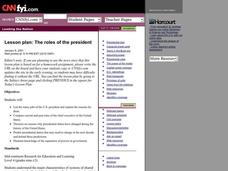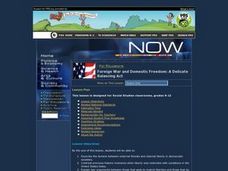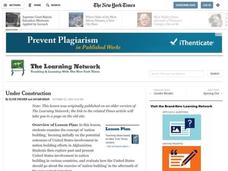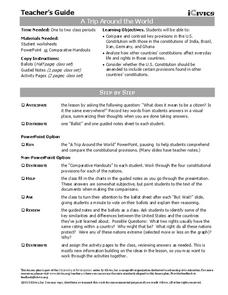Curated OER
The Roles of the President
High schoolers list the many jobs of the U.S. president and explain the reasons for them. They compare current and past roles of the chief executive of the United States.
Curated OER
US & Iroquois Constitution Parallels
Students engage in a lesson that is concerned with the concepts related to comparing the United States and Iroquois Indians while focusing upon the foundations of the ruling documents like the US Constitution. They conduct research using...
Curated OER
New Kent School and the George W. Watkins School:
High schoolers research the U.S. Supreme Court case that forced the integration of public schools and meet the individuals who experienced segregation, fought to dismantle the institution, and integrated the public school system of New...
Curated OER
The Federalist Papers
Students identify the Articles of Confederation and explain why it failed. They explain the argument over the need for a bill of rights in the Constitution and James Madison's role in securing its adoption by first Congress. Finally,...
Curated OER
Citizens Together
Students examine the bill of rights as it relates to founding documents and their significance today. In this bill of rights lesson plan, students use newspapers as sources to answer critical questions regarding democratic citizenship....
Curated OER
Teaching With Documents Lesson Plan: Sioux Treaty of 1868
Students study the Sioux and their lives in the Black Hills before 1868. They engage in a wide variety of cross-curricular activities which give them a good understanding of the Sioux culture.
Curated OER
Foreign War and Domestic Freedom: A Delicate Balancing Act
Students investigate civil liberties in the U.S. They watch and discuss a PowerPoint presentation, conduct research on an event from a timeline, complete a worksheet, take an ideology quiz, and conduct a debate.
Curated OER
Expansion and Reform: Applying the Declaration of Independence
Students conduct inquiries and research-acquiring, organizing, analyzing, interpreting, evaluating, and communicating facts, themes, and general principles operating in American history. They use the Declaration of Independence to...
Curated OER
Under Construction
Young scholars examine the concept of 'nation building,' focusing on outcomes of U.S. involvement in nation building efforts in Afghanistan, past and present attempts at nation building and how the U.S. should proceed in the war against...
Curated OER
Separation of Powers
Students examine the roles of each of the branches of U.S. government. In this checks and balances lesson, students watch Discovery video segments and discuss the concept of federalism as they create a school-wide policy for government...
Curated OER
Bison on the Plains
Fifth graders explore U.S. geography by reading assigned text about American Indians. In this migration lesson, 5th graders identify the differences between Native Americans and European settlers who traveled through middle America in...
Curated OER
Voting
Students investigate voter participation in the U.S. They watch and discuss a Bill Moyers video, complete a handout, and develop a plan to help a community overcome obstacles to voter participation.
Curated OER
Create Your Own Constitution
Eighth graders explore the processes, purpose and components of a good and just constitution. They focus on the Constitution of the United States of America. Students discuss the purpose of a constitution and reasons why the Constitution...
Curated OER
Telegram from Senator Joseph McCarthy to President Harry S. Truman
Students research Senator Joseph McCarthy's February 9, 1950 speech, given at Wheeling, West Virginia, in which he claimed more than 200 State Department employees were members of the Communist Party.
Curated OER
Bill of Rights
Students work in collaborative groups to research an amendment of the Bill of Rights. They then design and present a skit that demonstrates and communicates the core values and concepts of the amendment to the class.
Curated OER
Political Asylum Talk Show
Learners view videos, visit websites, and read about the nature and changes made to the idea of political asylum. Beginning with Jewish refugees fleeing Nazi Germany, they will explore policy change throughout the years. The lesson...
Curated OER
American Studies
Entitled American Studies, this small unit covers various topics related to the study of the United States. Learners warm up by creating a dictionary of democracy, then dive into three different lessons focused on government, famous...
Curated OER
What Is Democracy?
Students explore the concept of democracy. They define and describe democracy and choose an issue they believe the government should care about for its people. They write a persuasive essay about their issue.
Minnesota Center for Community Legal Education
Minnesota v. Hershberger
Freedom of religion has been a controversial, yet fundamental, tenet of the United States since even before the nation's birth. In a well-constructed lesson, the class compares the Minnesota Constitution to the US Constitution as a means...
iCivics
A Trip Around the World
How do the rights of citizens in other countries, such as India, Germany, Brazil, and Iran, compare to those of Americans? Take a closer look at the provisions of various foreign constitutions, and compare and contrast the protections...
Curated OER
Case Studies on the Sixth Amendment
Students trace the historical background of the sixth Amendment to the Constitution. They identify the legal issues and legal arguments in the cases studied, and evaluate the court's decisions.
Curated OER
American History Through the Len of the Supreme Court Decisions
Students examine the historical background of Supreme Court decisions and the basic principles behind legislation. As part of the lesson, students discover legal concepts and terms and write sentences using the vocabulary they have...
Bill of Rights Institute
Freedom for All?
What did abolitionists have in common with those working for women's rights? How has the Native American struggle for voting rights differed from the struggles of other groups? Class members examine the 15th, 19th, 23rd, 24th, and 26th...
National History Day
Challenging the Status Quo: Women in the World War I Military
Why are some so resistant to change? The status quo is often to blame for a lack of forward movement in society. Following the events of World War I, women in America suddenly had a voice—and were going to use it. Scholars use the...

























